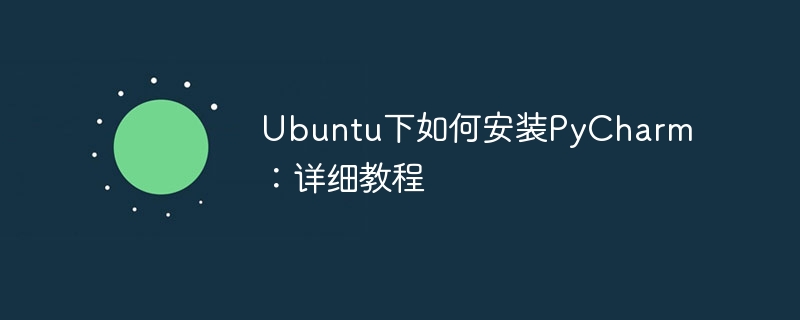

Ubuntu is a widely used open source operating system, and PyCharm is a powerful Python integrated development environment. This article will introduce you to how to install PyCharm in the Ubuntu operating system, and provide detailed tutorials and code examples.
Step 1: Download PyCharm
First, we need to download the PyCharm installation package. You can download the free community version on the PyCharm official website, or you can choose the paid professional version, depending on your personal needs.
Step 2: Install Java Development Kit (JDK)
PyCharm requires the support of Java environment when running, so we need to install Java Development Kit (JDK). Please enter the following command in the terminal to install JDK:
sudo apt-get install default-jdk
You may need to enter a password during the installation process and wait for the installation to complete.
Step 3: Unzip and install PyCharm
After the download is completed, we need to unzip PyCharm to a suitable directory. Open the terminal and use the following command to decompress the compressed package:
tar -xvf pycharm-*.tar.gz
After decompression is completed, enter the decompressed directory:
cd pycharm-*
Then, execute the following command to run the PyCharm installation wizard:
./bin/pycharm.sh
PyCharm will launch and begin the installation process. When you run it for the first time, it will ask you to select an installation type and set up some initial configuration. Follow the prompts until the installation is complete.
Step 4: Create a desktop shortcut
For ease of use, we can create a desktop shortcut to start PyCharm. First, enter the desktop directory:
cd ~/桌面
Then, create a shortcut to PyCharm. Open the terminal and enter the following command:
touch pycharm.desktop
Use a text editor to open the pycharm.desktop file and copy and paste the following code into the file:
[Desktop Entry] Name=PyCharm Exec=/path/to/pycharm/bin/pycharm.sh Icon=/path/to/pycharm/bin/pycharm.png Terminal=false Type=Application Categories=Development;IDE;
Please change /path/to/ Replace pycharm/ with your actual PyCharm installation path. Save the file and exit the text editor.
Next, you need to set the pycharm.desktop file as an executable file. Enter the following command in the terminal:
chmod +x pycharm.desktop
Now, you can see the shortcut of PyCharm on the desktop.
Step 5: Start PyCharm
Double-click the PyCharm shortcut on the desktop and PyCharm will start. On initial run, it will ask you to select a theme and configure some personalization settings. Make your selections based on your preferences and click "OK" to start using PyCharm.
Code example:
The following is a simple Python program example, which can be used to test whether the installation of PyCharm is successful:
print("Hello, PyCharm!")Open PyCharm, create a new Python file, and paste the above code Go in. Save and run the code. If you see "Hello, PyCharm!" in the terminal, congratulations, the installation of PyCharm has been successful!
Summary:
This article introduces you to the detailed steps and code examples for installing PyCharm in the Ubuntu operating system. PyCharm is a very powerful Python integrated development environment that can greatly improve the efficiency and quality of Python development. Hope this article helps you!
The above is the detailed content of Detailed guide to install PyCharm on Ubuntu operating system. For more information, please follow other related articles on the PHP Chinese website!
 Solution to the problem that win10 download software cannot be installed
Solution to the problem that win10 download software cannot be installed
 How to solve the problem that the hard disk partition cannot be opened
How to solve the problem that the hard disk partition cannot be opened
 update statement usage
update statement usage
 Free website domain name
Free website domain name
 Delete redundant tables in the table
Delete redundant tables in the table
 What does wifi deactivated mean?
What does wifi deactivated mean?
 How to optimize a single page
How to optimize a single page
 What are the methods to change IP in dynamic vps instantly?
What are the methods to change IP in dynamic vps instantly?




